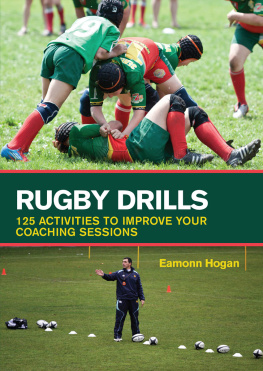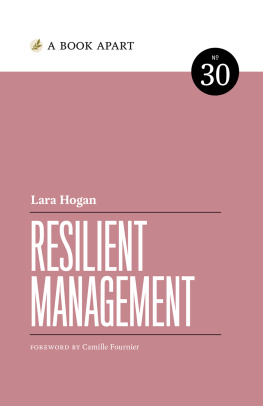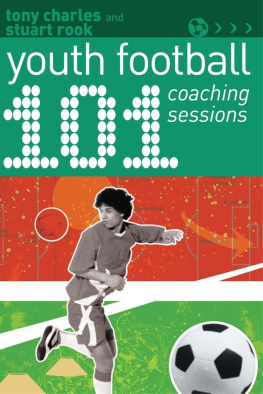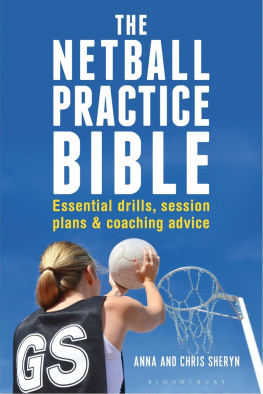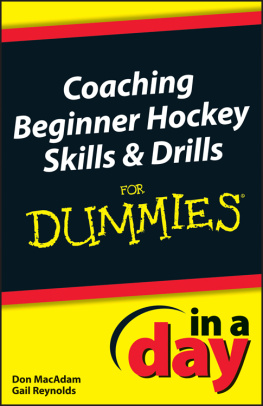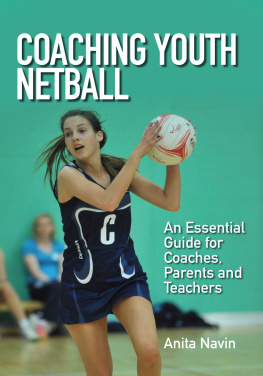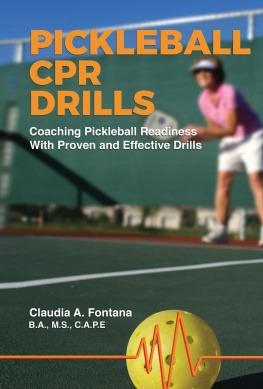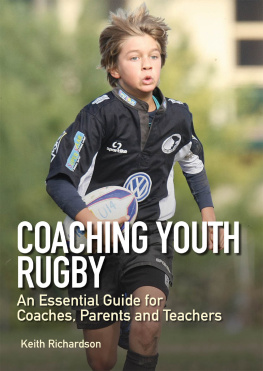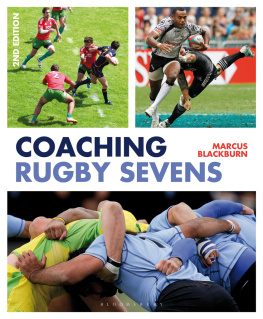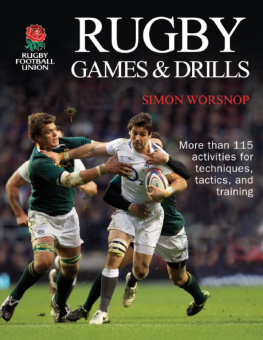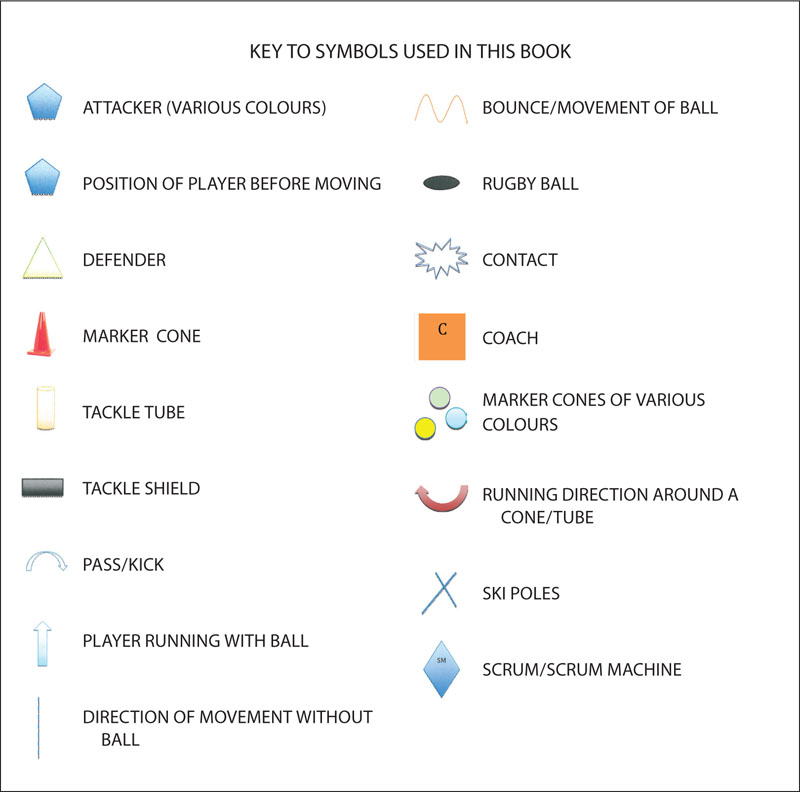RUGBY DRILLS
125 ACTIVITIES TO IMPROVE YOUR
COACHING SESSIONS
Eamonn Hogan

THE CROWOOD PRESS
First published in 2014 by
The Crowood Press Ltd
Ramsbury, Marlborough
Wiltshire SN8 2HR
www.crowood.com
This e-book first published in 2014
Eamonn Hogan 2014
All rights reserved. No part of this publication may be reproduced or transmitted in any form or by any means, electronic or mechanical, including photocopy, recording, or any information storage and retrieval system, without permission in writing from the publishers.
British Library Cataloguing-in-Publication Data
A catalogue record for this book is available from the British Library.
ISBN 978 1 84797 656 7
Acknowledgements
This book would not have been made possible without the kindness and hard work of many throughout the last twenty-plus years who really deserve to have their contributions noted here but for brevity reasons, I will name check just a few.
In the USA, I would like to thank Alex Goff and Jackie Finlan for allowing me to spread my propaganda throughout the States and a worldwide audience of fellow rugby voyeurs. Also to the following amazing individuals: Lisa Rosen, Danielle Miller, Kathy Flores, Brett Mills, Coilin Jones, Sean OLeary, Dr Steve Durant, Bruce Maclane, Mike Tolkin, Bob Weir, Lance Connolly, Mike Diamantopoulous, Dan Payne, Scott Lawrence, John Connolly, Drew Fautley, Michael Engelbrecht and Will Salty Thompson. And the inimitable Paule and Ann Barford among the top five coolest people I have ever met.
Thanks to Andy and Debbie Byrne, the best rugby administrators I know and to the players, coaches, referees and administrators of Lincoln RFC for the kindness they have shown my family over the years
At Leicester Tigers, from both the past and the present I would like to thank the following: Dusty Hare, Andy Key, Neil McCarthy, Carl Douglas, Graham Rowntree, Neil Back, Mike Penistone, Richard Cockerill, Pat Howard and Scott Clarke. Final thanks must go to the one person who spent most of her time over my five years at Tigers stopping me from making a complete fool of myself Teresa Carrington, thank you so much.
Thanks to Dan Cottrell and Mark Lawford at Green Start Media whose confidence in me led to my meeting with the Crowood Press..
To my brother Sean and his wife Trish and to my parents Mary and Thomas Hogan my passion for sport, my love of family and the belief that I could achieve far more than my education may suggest, are all down to you. To my sons Brandon and Ewan you continually make us laugh and fill us with pride with everything that you do.
Finally, to my wife Samantha. mother, MSc, rugby coach, rugby referee, hockey umpire, paramedic, university lecturer, advisor to the RFU and published author. All of this and she still has time to stop me killing our children with poorly cooked food. Thank you for being the most significant part of my life.
Contents
Introduction
In my time as a rugby coach, the one phrase that has annoyed me the most is, Rugby is a simple game, really. If it is a simple game, why are there five levels of rugby coaching award in the UK?
Rugby is really not a simple game, no more than chess is simply a matter of moving a few strange-looking figures around a board. Getting across to a new player the simple idea of running forward and passing backwards can attest that simple isnt really a word that springs to mind. With patience, understanding and a willing participant, play does improve with practice. Over time, a greater appreciation of those who do play rugby with a reasonable degree of skill soon becomes apparent.
As difficult as it is to play rugby, many assume the major challenges are over once they decide to step into the spotlight and become a coach. Coaching any sport is a significant challenge that can be aided by having played that sport but, for many coaches, their children or their partners drew them to rugby so they may not have any real background in rugby to call upon. It is in these cases, where the parent or player has stepped into a new role in rugby, that this book becomes invaluable.
When people attend coaching courses, they do so with the understanding that they need to progress their own skills and knowledge to aid the growth of their own team. What isnt so forthcoming on these courses is how to maintain a level of energy about your sessions over the course of several seasons following that original qualification.
There are many challenges put before a coach but primary among them is the desire to keep reinforcing the same positive ideas in new and imaginative ways, which is where this book can help you the most.
This book has been written in an easy-to-read format along with well-developed and thought-out activities that will aid you in getting your messages across to your team while also making them think carefully about what it takes to complete the challenges you have placed in front of them. Many were created by myself but some have been used by the most famous coaches in the world and I have made them much more user-friendly for the development of players in rugby.
These activities were designed for you to use without the need of purchasing specialist and expensive equipment, as all that is required to complete the activities within this book are a few basics available to every rugby coach within a club or school:

| Willing players |

| A number of rugby balls |

| Cones of various colours |

| A few tackle shields |

| A few tackle bags |

| A stopwatch |

| A whistle |
This book is designed to sit next to your laptop or in your home, to find that drill that really nails what you want to achieve from the next session with your team.
The book does not pontificate on why a drill needs to be used, why your team should use it, or when it needs to be put into place in your season; it simply passes on the drill, with a very straightforward explanation of what is required without trying to make them out to be more than they are.
Remember, you are the coach of your team and although there are many books that can tell you how to coach, this book assumes you know your team better than anyone else and what you really need is a resource to emphasize a point to them in an imaginative way thats it.
I hope you and your team enjoy the drills in this book and I wish you continued success.
CHAPTER 1 THE WARM-UP
This chapter contains the following drills designed to facilitate warm-up sessions.

